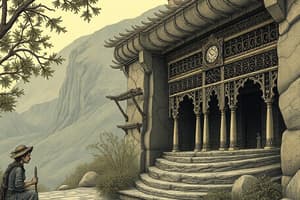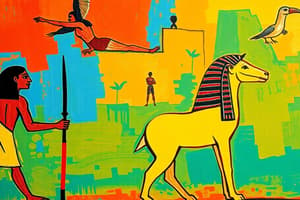Podcast
Questions and Answers
What characterized the societies during the Prehistory period?
What characterized the societies during the Prehistory period?
- City-states and monarchies
- Industrialization and urbanization
- Feudalism and chivalry
- Nomadic hunter-gatherer societies (correct)
Which ancient civilization is credited with the invention of writing?
Which ancient civilization is credited with the invention of writing?
- Mesopotamia (correct)
- Ancient Egypt
- Ancient Greece
- Ancient Rome
What was a significant cultural achievement of Ancient Greece?
What was a significant cultural achievement of Ancient Greece?
- Construction of pyramids
- Development of irrigation systems
- Establishment of a global empire
- Contributions to democracy and philosophy (correct)
What characterized the Middle Ages?
What characterized the Middle Ages?
What was a significant event of the Early Modern Period?
What was a significant event of the Early Modern Period?
What was a significant outcome of the Industrial Revolution?
What was a significant outcome of the Industrial Revolution?
What was a characteristic of the Nationalism and Imperialism period?
What was a characteristic of the Nationalism and Imperialism period?
What was a significant event of the Contemporary Period?
What was a significant event of the Contemporary Period?
What was a characteristic of the Ancient Rome period?
What was a characteristic of the Ancient Rome period?
What was a characteristic of the Ancient Egypt period?
What was a characteristic of the Ancient Egypt period?
Flashcards are hidden until you start studying
Study Notes
Prehistory
- Period of time before written records (circa 2.5 million years ago to 3500 BCE)
- Characterized by nomadic hunter-gatherer societies
- Development of stone tools, agriculture, and early settlements
Ancient Civilizations
- Mesopotamia (3500 BCE - 539 CE):
- Sumerians, Akkadians, Babylonians, and Assyrians
- Inventions: writing (cuneiform), wheel, and irrigation
- Ancient Egypt (3100 BCE - 30 BCE):
- Pharaonic dynasties, pyramids, and mummification
- Hieroglyphic writing and papyrus
- Ancient Greece (8th century BCE - 146 CE):
- City-states: Athens and Sparta
- Contributions: democracy, philosophy, theater, and Olympics
- Ancient Rome (8th century BCE - 476 CE):
- Republic and Empire periods
- Contributions: law, architecture, and governance
Middle Ages
- Period of time between ancient and modern civilizations (500 - 1500 CE)
- Characterized by:
- Feudalism and chivalry
- Rise of Christianity and Islamic empires
- Limited scientific progress and cultural achievements
Early Modern Period
- Renaissance (14th - 17th centuries):
- Revival of classical learning and cultural achievements
- Emergence of humanism and individualism
- Age of Exploration (15th - 17th centuries):
- European discovery and colonization of the Americas
- Establishment of trade routes and global connections
Modern Period
- Industrial Revolution (18th - 19th centuries):
- Transition from manual labor to machine-based manufacturing
- Development of capitalism and urbanization
- Nationalism and Imperialism (19th - early 20th centuries):
- Rise of nation-states and colonial empires
- Competition for resources and global influence
Contemporary Period
- World War I and II (20th century):
- Global conflicts and rise of superpowers
- Establishment of international organizations and global governance
- Cold War and Decolonization (mid-20th century):
- Bipolar world order and proxy wars
- Independence movements and emergence of new nation-states
Prehistory
- Lasted from circa 2.5 million years ago to 3500 BCE
- Characterized by nomadic hunter-gatherer societies
- Development of stone tools and early settlements
- Agriculture emerged, marking significant shift in human society
Ancient Civilizations
- Mesopotamia (3500 BCE - 539 CE):
- Home to Sumerians, Akkadians, Babylonians, and Assyrians
- Invented writing (cuneiform), wheel, and irrigation systems
- Developed city-states, with complex governance systems
- Ancient Egypt (3100 BCE - 30 BCE):
- Pharaonic dynasties built pyramids, developed mummification
- Hieroglyphic writing and papyrus production flourished
- Achieved significant architectural and engineering feats
- Ancient Greece (8th century BCE - 146 CE):
- City-states Athens and Sparta emerged as cultural hubs
- Contributions: democracy, philosophy, theater, and Olympic Games
- Famous philosophers like Socrates, Plato, and Aristotle
- Ancient Rome (8th century BCE - 476 CE):
- Republic and Empire periods saw significant expansion
- Contributions: law, architecture, and governance systems
- Developed aqueducts, roads, and public buildings
Middle Ages
- Lasted from 500 to 1500 CE
- Characterized by:
- Feudalism and chivalry dominant social structures
- Rise of Christianity and Islamic empires
- Limited scientific progress, cultural achievements stagnant
- Black Death pandemic had significant impact on population
Early Modern Period
- Renaissance (14th - 17th centuries):
- Revival of classical learning and cultural achievements
- Emergence of humanism and individualism
- Artistic innovations, such as Leonardo da Vinci's works
- Age of Exploration (15th - 17th centuries):
- European discovery and colonization of the Americas
- Establishment of trade routes and global connections
- Explorers like Columbus, Vasco da Gama, and Magellan
Modern Period
- Industrial Revolution (18th - 19th centuries):
- Transition from manual labor to machine-based manufacturing
- Development of capitalism and urbanization
- Emergence of new social classes, industrial working class
- Nationalism and Imperialism (19th - early 20th centuries):
- Rise of nation-states and colonial empires
- Competition for resources and global influence
- Emergence of new global powers, like USA and Japan
Contemporary Period
- World War I and II (20th century):
- Global conflicts and rise of superpowers
- Establishment of international organizations and global governance
- League of Nations, then United Nations established
- Cold War and Decolonization (mid-20th century):
- Bipolar world order and proxy wars
- Independence movements and emergence of new nation-states
- Emergence of global issues, like nuclear proliferation and environmentalism
Studying That Suits You
Use AI to generate personalized quizzes and flashcards to suit your learning preferences.




